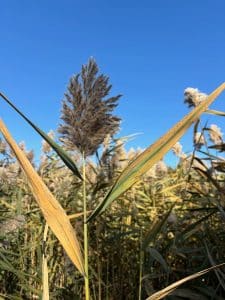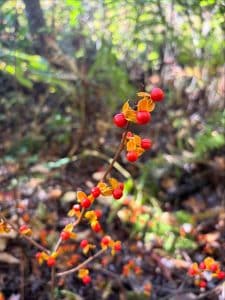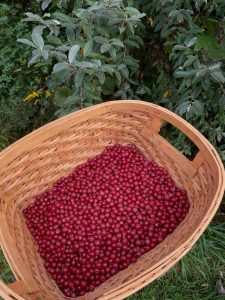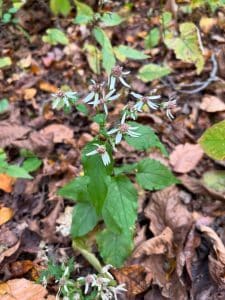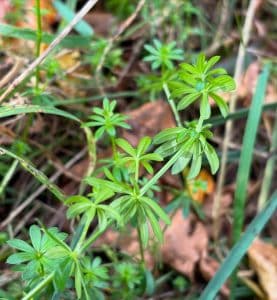Mountain sorrel (Oxyria digyna) is a common wild edible plant of the buckwheat family and can be found while foraging in arctic regions and mountainous parts of the Pacific Northwest. The Cascades or Sierra Nevada mountain ranges are particularly great habitats for mountain sorrel.
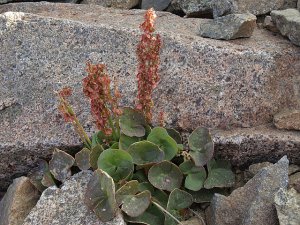
Mountain Sorrel is native to the Northern Hemisphere and one theory is that the melting of glaciers near the end of the Ice Age helped its distribution amongst mountainous and arctic regions.
Mountain sorrel typically grows in alpine areas, scree, snow-bed sites, and beside streams. Deer, Elk, and other large foraging animals in the Pacific Northwest favor mountain sorrel as an integral part of their diets.
Mountain Sorrel Edibility and Culinary Use
Mountain sorrel has been noted as an excellent source of Vitamin C, iron, magnesium, and calcium, making it an excellent addition to sandwiches or salads to add some healthy flavor. Its leaves have sweet, lemony overtones that make them unique amongst other greens.
Add a little lemon zing to your salad by adding some mountain sorrel to a spring mix or other salad leave mix. You can also spice up this Creamy Spinach with Dill by adding a handful of lemony mountain sorrel. Use whole or chopped sorrel, to bring a healthy, citrus garnish to flatbreads and pizzas.
Mountain sorrel also makes for lemony substitute for basil in this Sorrel Pesto Recipe. You can also warm up to this satisfying Sorrel Soup recipe. These recipes will require a significant amount of sorrel since you will be making concentrated purees and pests.

Since mountain sorrel is not listed as an endangered plant species, feel free to forage a little more than you think you’ll need for any of these recipes.
Mountain Sorrel Health Benefit
Mountain sorrel’s high content of Vitamin C, iron, magnesium, and calcium makes it the perfect way to boost your immune system, especially in colder months when fresh greens are not as available as this hardy plant that thrives in colder climates.
Mountain sorrel contains more Vitamin C than lemons, for example, 1 cup of chopped sorrel leaves delivers over 100% of your recommended daily Vitamin C and A intake. Thanks to its high Vitamin C levels, the Inuit in the Pacific Northwest have used mountain sorrel to both prevent and cure scurvy. Vitamin C is also known as a major immune system booster by supporting multiple cell functions of your body’s immune system and by fighting free radicals in the body that cause inflammation and oxidative stress.
Vitamin A has been closely connected to improvements in eyesight and the reduction of macular degeneration and cataracts. Beta-carotene, the precursor to vitamin A and the beneficial compound found in carrots, can greatly boost eye health, especially with preventing age-related sight degradation and improving night vision.
Mountain sorrel has been used to soothe skin conditions as well, and is used both topically and orally. Eating the dried leaves has been connected with a reduction in ringworm and dry, itchy skin. Grinding up fresh leaves allows you to collect the liquid extract which can be applied topically on areas of the skin to reduce the discomfort and severity of rashes and irritation.
Mountain Sorrel Cautions
Mountain sorrel must be consumed in moderation. Its acid taste is due to the presence of oxalic acid. Once consumed, oxalic acid can bond with other minerals such as calcium and iron to form oxalate compounds. These oxalate compounds are usually harmless, however, for those that are sensitive to these compounds, high-oxalate diets have been linked to an increased risk of health problems such as kidney stones.

Mountain sorrel tends to grow in mountainous regions, regions where abandoned and active mineral mines can be found. Soils in these areas have higher levels of heavy metals that can be absorbed by the plants. Avoid foraging for mountain sorrel, or any other edible plants, near any mine in the Pacific Northwest.
Caution must also be taken when cooking mountain sorrel. It’s best not to use cast-iron or aluminum cookware because the metal will interact with oxalic acid and form compounds that will create an unpleasant metal taste.
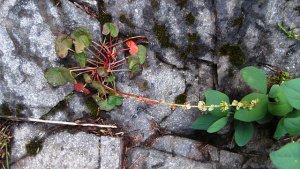
Conclusion
Mountain sorrel is a nutrient-packed edible plant that for the most part, is safe to forage throughout the Pacific Northwest. Its sweet, lemony taste makes it a nutrient-packed addition to salads, sandwiches, soups, and pestos. Mountain sorrel’s high Vitamin C and Vitamin A content helped to support healthy immune system and eye functions. Those who are sensitive to kidney stones or oxalate compounds, you should take caution when consuming mountain sorrel to prevent any negative reactions, otherwise, it is non-toxic when consumed in moderation.
Foraging for mountain sorrel in the Pacific Northwest can be difficult since the plant usually occurs in patches of 1-3 plants, however, it’s not uncommon to stumble upon large patches with 25 or more plants. You can cultivate mountain sorrel in your garden if the appropriate climate and soil conditions are present.
—————
Written by Jared DeValk
Jared DeValk is an author, writer, and entrepreneur who in his free time can be caught hiking, planting berry bushes, or doing home repairs and improvements. Jared's varied life experience and passion for research empassions him to write knowledgeably about many topics such as , Health & Wellness, Real Estate, Finance, Business, Cryptocurrency, Home Improvement, Agriculture, Camping/Hiking, and many more. Jared can be reached directly for speaking, marketing, and writing inquiries at JaredDeValk.com.
See our privacy policy for more information about ads on this site
Many of our readers find that subscribing to Eat The Planet is the best way to make sure they don't miss any of our valuable information about wild edibles.


